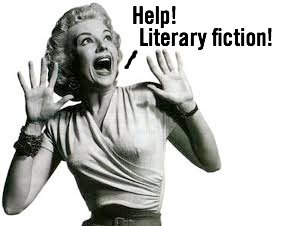How to Prepare for A Difficult Conversation
Over on Brevity, I published this essay "How to Prepare for A Difficult Conversation."
Providence: Your New Favorite Lit Scene?
Don't mess with ... Rhode Island either! In which I make the case that Providence, RI has "emerged from the literary shadows of more established hubs New York City and Boston to hatch a burgeoning scene all its own" for the GrubStreet blog.
When literary authors slum in genre
 There’s a curious phenomenon happening out there in LiteraryLand: The territory of genre fiction is being invaded by the literary camp.
There’s a curious phenomenon happening out there in LiteraryLand: The territory of genre fiction is being invaded by the literary camp.
While it could be argued that literary writers have always borrowed from fantasy, science fiction and horror, even stolen genre's best ideas, I think there's a new and significant shift happening in the past few years.
Take Justin Cronin, writer of respectable stories, who recently leaped the chasm to the dystopian, undead-ridden realm of Twilight. With The Passage, his post-apocalyptic, doorstopper of a saga, the author enters a new universe, seemingly snubbing his former life writing “serious books” like Mary and O’Neil and The Summer Guest, which won prizes like Pen/Hemingway Award, the Whiting Writer’s Award and the Stephen Crane Prize. Both books of fiction situate themselves solidly in the camp of literary fiction. They’re set on the planet Earth we know and love. Not so with The Passage, in which mutant vampire-like creatures ravage a post-apocalyptic U.S. of A. Think Cormac McCarthy’s The Road crossed with the movie The Road Warrior, with the psychological tonnage of John Fowles’ The Magus and the “huh?” ofThe Matrix.
Now comes Ricky Moody, whose ironic novels like The Ice Storm andPurple America were solidly in the literary camp, telling us about life in a more-or-less recognizable world. His latest novel, The Four Fingers of Death, is a big departure, blending a B-movie classic with a dark future world. The plot: A doomed U.S. space mission to Mars and a subsequent accidental release of deadly bacteria picked up on the Red Planet results in that astronaut’s severed arm surviving re-entry to earth, and reanimating to embark on a wanton rampage of strangulation.
And there’s probably other examples I’m forgetting at the moment.
So what’s all this forsaking of one’s literary pedigree about?
It began with the flipside of this equation. It used to be that genre writers had to claw their way up the ivory tower in order to be recognized by the literary tastemakers. Clearly, that’s shifted, as more and more fantasy, science fiction, and horror writers have been accepted by the mainstream and given their overdue lit cred. It’s been a hard row to hoe. J.R.R. Tolkien, C. S. Lewis, Philip Pullman and others helped blaze the trail to acceptance. Now these authors have been largely accepted into the canon. You can take university courses on fantasy literature and write dissertations on the homoerotic subtext simmering between Frodo and Sam. A whole generation, now of age and in college, grew up reading (or having read to them) the entire oeuvre of Harry Potter. That’s a sea change in the way fantasy will be seen in the future—not as some freaky subculture, but as widespread mass culture.
Yes, Margaret Atwood and Doris Lessing have delved into genre, although their works (A Handmaid's Tale, for example) was always taken as highbrow. Perhaps a better example: Stephen King, considered a hack horror writer for years who began publishing in the New Yorker in 1990. One wonders why the New Yorker finally caved and let him in the doors --- is this an implicit acknowledgement of his popularity? Or had King's writing gotten better. In any case, it's was a shocker when he began racking up impressive literary kudos, like in 2003 when the National Book Awards handed over its annual medal for distinguished contribution to American letters to King. Recently in May, the Los Angeles Public Library gave its Literary Award for his monstrous contribution to literature.
Now, as muggles and Mordor have entered the popular lexicon, the glitterati of literary fiction find themselves “slumming” in the darker, fouler waters of genre. (One reason: It’s probably more fun to write.) But in the end, I think it’s all about call and response. Readers want richer, more complex and more imaginative and immersive stories. Writers want an audience, and that audience increasingly reads genre. Each side—literary and genre—leeches off the other. The two camps have more or less met in the middle.
One wonders who’s going to delve into the dark waters next—Philip Roth? Salman Rushdie? Toni Morrison? Actually, it turns they already (sort of) have --- Roth explores alternative history in The Plot Against America;
Rushdie's "Magical Realism," of Midnight's Children, in which children have superpowers. You might even argue that Morrison's Beloved is a ghost story.
[thanks to readers at Tor.com, where this post originally appeared, for catching some errors and helping me revise this into a better essay]
Ethan Gilsdorf is the author of Fantasy Freaks and Gaming Geeks: An Epic Quest for Reality Among Role Players, Online Gamers, and Other Dwellers of Imaginary Realms, which comes out in paperback in September. Contact him through his website,www.ethangilsdorf.com
Does Justin Cronin's "The Passage" live up to the hype?
Where the wild things are
In Justin Cronin’s blockbuster hybrid novel, the thriller elements wrestle with the literary, while super vampires maul fleeing humans
Weighing in at 766 pages and 2 pounds 6 ounces, “The Passage’’ is designed to be big. Big plot, big themes, big sweep. And the author, Justin Cronin, landed himself a big advance. After a knock-down, drag-out bidding war, Ballantine paid about $3.75 million for the book plus two sequels in the pipeline. Director Ridley Scott’s production company ponied up $1.75 million for the film rights. “The Passage’’ has become one of those media machine-generated blockbusters, feeding upon the weight of everyone’s expectations. Like a small financial entity unto itself, it’s too big to fail.
Still, “The Passage’’ is a gamble. With this post-apocalyptic, doorstopper of a saga, the author enters a new universe. In his former life, the New England native wrote works of literary fiction, “Mary and O’Neil’’ and “The Summer Guest,’’ which won prizes like the Pen/Hemingway Award. They’re set on the planet Earth we know and love. No undead in sight.
“The Passage’’ is different. It began as a storytelling game with Cronin’s then 9-year-old daughter. She wanted to spin a yarn about “a girl who saves the world.’’ After he started writing, Cronin, an English professor at Rice University in Houston, sensed that, like the virus the plot hinges on, the project was changing him. He noted in one interview, “I knew by the time I’d finished this I would be a different person — and a different kind of writer.’’ He’d given birth to a monster.
And “The Passage’’ is a bastard beast, a literary-thriller hybrid both portentous and predictable. Think Cormac McCarthy’s “The Road’’ crossed with the movie “The Road Warrior,’’ with the psychological tonnage of John Fowles’s “The Magus,’’ and the “huh?’’ of “The Matrix.’’ Mix in J.R.R. Tolkien’s fantasy of fellowships and quests and add Stephen King’s dark, virus-ridden vision in “The Stand.’’
Now comes the $5.5 million dollar question: Does Cronin pull it off?
First, know “The Passage’’ is no bedtime story. Suffice it to say, by the time we reach page 50, we’ve already been introduced to adultery, prostitution, and murder. The premise: A few, unspecified years in the future (where, thankfully, USA Today is still in print), a nasty virus unleashed in the Bolivian jungle gives its victims a kind of immortality. Naturally, this interests the US military, who could sure use this superpower in its endless fight against terrorists who strike at home and abroad.
So, a secret military project begins deep in the Colorado mountains. Those experiments go awry, and the 12 test subjects escape from their glass chambers — why does this always happen? — and begin their fearsome rampage across the nation. With every bite they spread the gift that keeps on giving. The victims become jacked-up killers themselves, glowing vampires on steroids known as “virals.’’
Before you know it, complex plotlines are bulldozed across the landscape and laid down like the Eisenhower Interstate Highway System — plotlines that are broad and clear and fast, and destined to run together. Cronin intercuts the stories of a death row inmate, a nun, a pair of FBI agents, and a desperate mother and her daughter named Amy. Familiar themes emerge: science and the military punished for their hubris; the man who turns on bureaucracy to do what’s right; the child prodigy whose secret powers might save us all. That’s just in part one. The story builds from there, following more than a dozen main characters and unfolding over decades.
Certainly Cronin has fun with his destroyed America, one in which Jenna Bush was governor of Texas, and, in an eerie parallel with today’s headlines, the oil industry is under federal protection. Later, some decades after the initial outbreak, we encounter a whole set of new characters, and they take us through the second half of “The Passage.’’ This ragtag colony survives in a Walden-like castle compound, fighting back the bloodthirsty devils. They also raid the ruined mall — REI, Footlocker, and the Gap — for supplies, stumble upon dusty relics like “Where the Wild Things Are’’ (get it?) and wonder whether anyone else has survived. “Grief was a place . . . where a person went alone,’’ Cronin writes. Life is “a series of mishaps and narrow escapes.’’ In these moments, “The Passage’’ surpasses genre fiction, and approaches existential meditation.
Cronin’s prose is thick and meaty and at times elegant. Texas is described as a “state-sized porkchop of misery’’; 9/11 is called “the money shot of the new millennium.’’ In another passage, Wolgast, the FBI agent with the heart of gold whose fate is tied to Amy’s, takes a nap, and enters “sleep’s antechamber, the place where dreams and memories mingled, telling their strange stories.’’ Indeed, much of “The Passage’’ takes place in the murky minds of its protagonists.
Cronin has a literary novelist’s eye for detail and local color, and an eagerness to create believable characters with feelings. However, this impulse collides with the necessities of the supernatural, sci-fi horror thriller. The collision is not always pretty.
For one thing, Cronin has a lot of ground to cover. That means passages of exposition, some of them lengthy and rammed down the throats of characters. An inventive mix of e-mails, diaries, and documents partially alleviates this need for our heroes to spout off too much. But just as often, the interior voice mumbo-jumbo — nightmares and telepathic messages — leaves the reader scratching her head.
The other trouble is emotional gravitas. Cronin’s roving narrator enters the heads of each character. They’re compelling folk, to be sure, desperate to hope, and afraid to love in the face of their bleak condition. But we’re asked to juggle the detailed back stories and desires of so many characters, it’s hard to know on whom to hang our heart strings. Thankfully, the connective tissue across space and time is Amy, the “Girl from Nowhere,’’ the one we meet on page one who we can guess has a role in the story’s conclusion.
Still, some readers deep into “The Passage’’ will be spellbound. They’ll want to know how it turns out. And they’ll also wonder who will play whom in the movie version. How the stunt people will stage the battles and chases. And how cool it will be for the set designers to build malls and casinos, then blow them up.
Ethan Gilsdorf, author of “Fantasy Freaks and Gaming Geeks: An Epic Quest for Reality Among Role Players, Online Gamers, and Other Dwellers of Imaginary Realms,’’ can be reached at ethan@ethangilsdorf.com. ![]()
